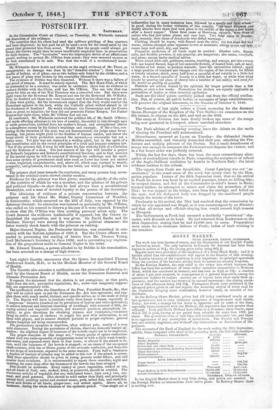The Paris advioes of yesterday evening leave the debate on
the mode of electing the President still undetermined.
Disturbances occurred at Lyons on Tuesday: the disbanded Gerdes Mobiles assembled, and riotously demanded their pay, attacking the Pre- fecture and making prisoner of the Prefect. But a small detachment of troops was enough to recapture the Prefecture and disperse the rioters; and in a few hours order was perfectly restored.
Within the last few days, there has been the most extraordinary alter- nation of contradictory reports in Paris, respecting the acceptance or refusal of the Anglo-Gallican mediation by Austria in Northern Italy: the latest evidence inclines to the refusal.
The reports from Pesth are formidable. Count Lemberg was not " as- sassinated," in the usual sense of the word, but openly slain by the Hun- garian populace. Letters of the 28th September state, that on his arrival in Pesth his house was beset by an excited populace, intent on killing him; he escaped thence and fled to the Commander-in-chief's house in Buda; tracked thither, he attempted to return and claim the protection of the Diet; he was stopped on the bridge, torn from his carriage, and killed on the spot; and his disfigured body was dragged by the maddened people through the streets of the town.
Previously to his arrival, the Diet had resolved that the commission by which he was appointed was illegal, as it was countersigned by no Minister; and that all troops and officials obeying him would commit high treason to Hungary.
The Government at Pesth had assumed a decidedly "provisional" cha- racter, with Kossuth at its head. He had returned from Kecksemet on the 28th September, stating that he had 12,000 men in camp. Preparations were made for an obstinate defence of Pesth; ladies of rank working in the trenches.


























 Previous page
Previous page